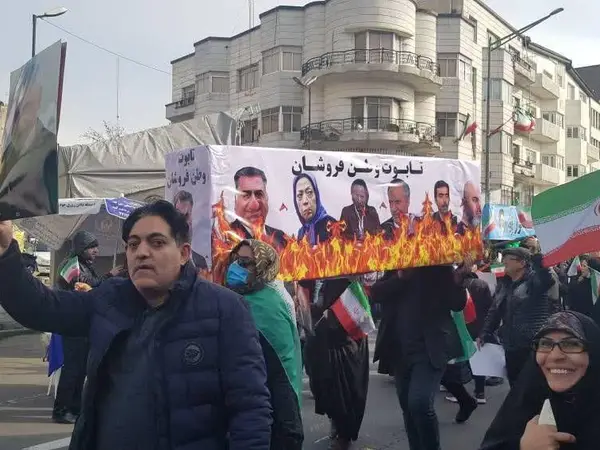While Iran’s President Ebrahim Raisi was delivering his speech during the government organized revolution day ceremonies, hackers interrupted the broadcast.
Raisi was speaking in Tehran’s Azadi square where people were gathered to mark the 44th anniversary of the Islamic Republic, an occasion when the regime was determined to show that it still enjoys popularity.
The hacktivist group Ali’s Justice (Edalat-e Ali) hacked the broadcast from the state TV and aired the slogan “Death to Khamenei”. It also called on the people to withdraw their money from government banks and called on the people to take part in antigovernment protests on February 16.
The regime had forced students, millions of public sector employees and soldiers to take part in the gathering and parades in different cities, together with its own base of support among families of regime loyalists, clerics and the paramilitary Basij organization.
A Twitter user posted a comment that “Well, somehow you did accomplish your [revolution day] march, by threatening school children with reducing their grades, government employees with financial penalties…my question is: Did you solve our problems?”
Raisi in his speech said the regime will embrace those “who were deceived during riots”, referring to last year’s popular protests and welcome them back “into the embrace of the nation.” He spoke of Supreme Leader Ali Khamenei’s “fatherly love” and his magnanimity in pardoning detained protesters.
The president went on repeating the official propaganda line that foreigners instigated the protests to “destroy Iran”. The regime is adept at trying to equate itself with the country and its vital interests when it faces a serious challenge.
These remarks reveal that the hardliner core of the regime headed by Khamenei is in no mood to start some sort of dialogue, at least with former regime loyalists to somewhat pacify the anti-regime mood in the country.
However, former President Hassan Rouhani told local reporters during the ceremonies that “We should not allow a power-hungry minority to push the majority aside,” adding that this “would be the end of the [Islamic] revolution.”
He was clearly referring to hardliners and ultra-conservatives who have taken over both the legislature and the presidency with Khamenei’s support in the past three years.
The Islamic government should listen to diverse ideas and the people’s voice to guarantee the survival of the revolution, he added.
Regime officials use the term revolution as a synonym for the Islamic Republic.
In recent days, prominent former officials have demanded a revision of the constitution or a new one by forming a constituent assembly and holding referendums.
Former prime minister and leader of the reformist Green Movement, Mir-Hossein Mousavi in a statement issued earlier this month said the reform movement has failed and it is time to make “fundamental changes.” Mousavi’s call is tantamount to a regime change if people are allowed to freely vote for a new form of government.
Former President Mohammad Khatami also called for serious changes, although he stopped short of saying the Islamic Republic must go.
Meanwhile, eight prominent exiled activists, including Prince Reza Pahlavi and Nobel laureate Shirin Ebadi, held a joint forum in Washington DC on Friday signaling the launce of a united protest leadership in the diaspora.
